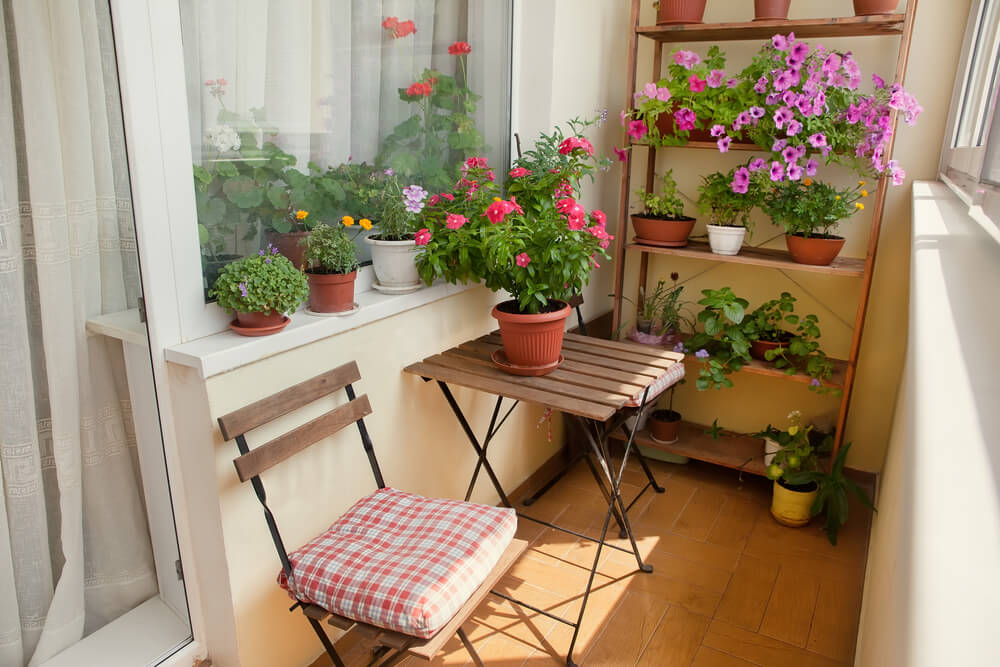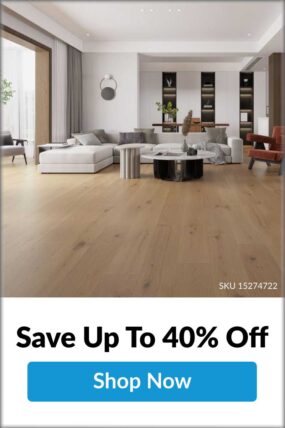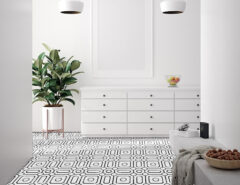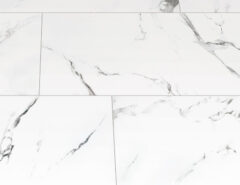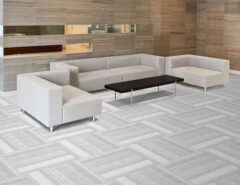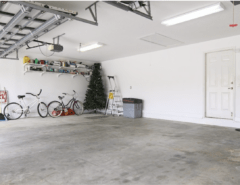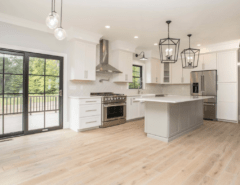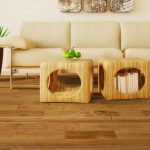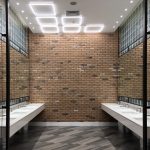Many of you now work, and workout, at home, and that long-standing flex space has permanently transitioned into an office or home gym with flooring that is no longer ideal for its new use. Perhaps your office or new exercise space would benefit from engineered hardwood flooring made with real wood or mostly waterproof vinyl flooring to completely transform the space.
The demand for wood-look flooring shows no signs of slowing. In response to the popularity, every flooring category offers a wide range of wood looks, even ceramic and porcelain tile! However, that does not mean that all wood looks are equal. Each category has its advantages and disadvantages. So, how do you know which wood-look flooring is right for you?
Let’s walk through a side-by-side comparison of engineered hardwood and vinyl flooring to help you decide if either of these flooring products suit your design tastes, your budget, and your space’s functionality.
Shared Benefits of Vinyl and Engineered Hardwood Flooring
Both vinyl and engineered hardwood offer a spectrum of grains, colors, finishes, and plank widths. Vinyl and engineered hardwood are durable and pet-friendly to varying degrees. Water-resistant versions are available in each category. Maintenance consists of simple damp mopping to keep it clean and looking great. Installation is quick and easy with the right tools and a little bit of DIY know-how.
Engineered Hardwood Flooring
Advantages
Engineered hardwood is tough to beat when it comes to looking like solid hardwood, because it is real wood. Its genuine wood veneer, or top layer, allows it to maintain the same warm feel and classic wood look as solid hardwood flooring.
Due to its construction, it can be installed in areas where moisture and heat exposure could damage solid hardwood, like basements. Professional installation is not required, meaning a savvy DIYer can put it down, saving time and money. It can last anywhere from 20 to 80 years, or longer, if maintained properly.
Downsides
Engineered hardwood is not without its flaws, however, they are few and far between. Over time it can scratch and chip; after all it is still wood. Some engineered hardwood floors can’t be refinished due to a thin veneer. This poses two problems; you have to live with any wear and tear that may occur, and you will not get the longevity that you anticipate. The solution? Buy a good quality engineered hardwood.
Compared to Other Materials
Hardwood vs. Engineered Hardwood
Engineered hardwood is considerably less expensive than hardwood flooring when it comes to product and installation costs. Hardwood flooring is more susceptible to changes in heat and humidity. Engineered hardwood is more resilient to these changes due to its structural stability.
Engineered hardwood can be more resistant to heat and water depending on the product. This doesn’t apply to all engineered hardwood, but many options are designed with water resistance and insulative properties in mind.
Vinyl vs. Engineered Hardwood
Engineered hardwood costs more than vinyl sheet and tile but is comparable in price to vinyl plank flooring. It is not capable of tearing or denting like vinyl and has a layer of genuine hardwood on the top-facing layer. Engineered hardwood can be refinished if the veneer is thick enough.
Laminate vs. Engineered Hardwood
Laminate and engineered hardwood are fairly equal when it comes to installation. Both offer click systems and can go down quickly compared to solid hardwood. Laminate uses a photographic layer to achieve its wood look, while engineered hardwood uses a top layer of solid wood.
Tile vs. Engineered Hardwood
Compared to ceramic tile, engineered hardwood transfers heat easily and is considerably more comfortable underfoot. Tile is cold and hard on joints. Both can be installed over radiant heating systems, and both can be installed below-grade in your basement.
Vinyl Flooring
Advantages
Vinyl flooring is extremely durable, scratch-resistant, and water-resistant. Vinyl sheet, tile, and plank are all easy to install. If damaged, the planks and tiles are easily replaced. Vinyl flooring is available in multiple colors, finishes, and wood species. Vinyl plank, in particular, is gaining ground on its realism when it comes to mimicking the natural characteristics found in hardwood.
Downsides
Vinyl flooring can tear or dent if heavy objects like furniture are dragged across it or left sitting for extended periods of time. Vinyl cannot be installed in the path of direct sunlight, or discoloration can take place, depending on the quality of the product. Vinyl plank cannot be refinished. Vinyl sheet and tile cannot be repaired, only replaced. Vinyl flooring’s lifespan tends to run from five to 20 years.
Compared to Other Materials
Hardwood vs. Vinyl
Vinyl can only get close to offering the same elegance and timelessness as hardwood. Considerably more affordable than hardwood, vinyl is certainly the go-to flooring product when budgetary constraints are present. When it comes to moisture resistance, vinyl clearly beats hardwood.
Laminate vs. Vinyl
Just like laminate, vinyl flooring visuals have come a long way, but haven’t quite achieved the same level of three-dimensional embossing or textured finish. Vinyl definitely outperforms when it comes to moisture. Water-resistant versions of laminate do exist, however, vinyl is designed from 100% synthetic materials, making it mostly waterproof.
Tile vs. Vinyl
Ceramic and vinyl flooring are both resistant to moisture and can be installed in bathrooms and basements. Only ceramic tile is impervious to heat and can accommodate a radiant heat system; vinyl is easily damaged by heat. Ceramic tile has an expected lifespan of around 40 years compared to the five to 20 lifespan of vinyl. When it comes to comfort, luxury vinyl is softer to walk on and warmer than tile any day of the week!
Which Material is Best?
Before you decide which material is best suited for your home based on application and design requirements, you must answer a few questions. First, where do you plan to place this flooring? Home office? Living room? Workout room? This will help you determine in what order to prioritize the characteristics of each flooring material. The needs of a home office are very different from that of a workout room, just like a bathroom’s flooring needs differ greatly from that of a living room.
Do you need to stay within a specific budget? Vinyl flooring’s affordability makes it appealing when working within financial parameters. Bear in mind that affordable does not necessitate cheap. Current vinyl flooring options are on-point with their realistic and elegant visuals.
Finally, what look or feel would you like for your space to exhibit? Do you want a clean aesthetic with a light wood look, or do you want a warm, inviting space? Modern? Rustic? The challenge is that both materials offer looks to complete any design taste. How do you decide?
The Best Way to Buy Engineered Hardwood and Vinyl Flooring
You can start your decision-making process by consulting BuildDirect’s team of trained experts. They are available to answer any questions you have concerning cost, installation, flooring style, and colors, when it comes to engineered hardwood or vinyl flooring.
We also have numerous how-to’s to help you with your flooring research like How to Increase the Value of Your Home or Wood Flooring in the Kitchen: Pros and Cons. Another flooring resource is our PRO Picks tab. Click on it to view premium engineered hardwood and vinyl flooring products chosen by contractors and home improvement professionals to see what the pros are using.
Whether you are a first time flooring buyer or an experienced installer, our pro rewards program will help you save costs and maintain high-quality end results. Become a member of our Pro Rewards program today for unlimited free flooring samples and many other benefits that will give you an edge over the competition.




